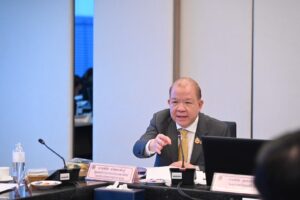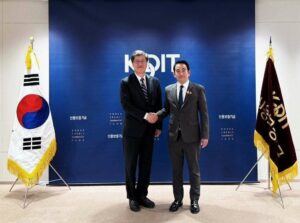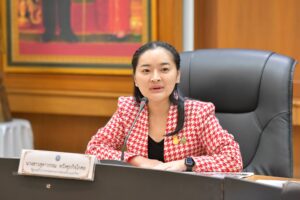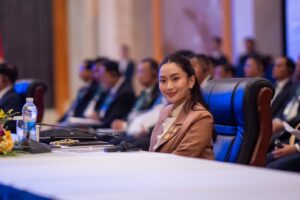A Statement by the Group of 40 MPs who had introduced the draft amnesty bill, for which they have submitted a petition to the NACC commissioners to drop the investigation
A Statement by the
Group of 40 MPs who had introduced the draft amnesty bill, for which they have submitted a petition to
the NACC commissioners to drop the investigation
The
National Anti-Corruption Commission (NACC) had ordered a sub-committee to be
set up to investigate the actions of Mr. Worachai Hema and the 40
former Members of Parliament (MPs) who tabled the amnesty bill on offenses from
political protests in 2013.
They were charged with putting forward a bill that would give a
blanket amnesty to criminals to absolve their offenses, which is an enactment
of a law with intent to help the wrongdoers by colluding to pass up the draft bill
that would obstruct the judicial process, through the abuse of power and
malpractice for illegal gains, as stated in the National Counter Corruption Act
B.E. 2542 (A.D. 1999) chaired by Miss
Supa Piyajitti as head of the investigating sub-committee.
After
being informed that an investigation panel had been set up, the 40 MPs
submitted a letter to the NACC asking for a review of the investigation order,
citing that it was unlawful and not within the NACC’s authority to do so. Later, the NACC sent a written notice to
inform that it was not in a position to conduct such a review. Thereby, Mrs. Somying Buabutr, one of the
accused, filed charges against Pol. Gen. Watcharapol Prasarnrajakij, President
of NACC and all of its 9 commissioners as defendants 1 to 9 and Mr. Baworn
Yasinthorn, who accused them, as the 10th defendant. The court has set a first hearing of the
witness on February 13, 2018.
Today,
the 40 MPs have submitted a petition to the NACC commissioners and to the
investigation sub-committee requesting them to drop the investigation with the
following reasons:
1. Proposing
a draft bill is the right of the legislative branch that is given absolute
privilege by the constitution.
The Thai Constitution 2017
sets out the Enactment of Acts, Article 142, where
members of the House of Representatives of not less than twenty members shall
be able to propose a draft bill. At the
time, the Rules for the House of Representatives B.E. 2551 (2008)
was enacted, with rules on steps to be taken set out clearly, from
submission of motions, debates, passing the resolutions and setting up the committees. At the first reading, a resolution is passed
to accept the motion; the bill shall then be considered by the committee at the
second reading and a resolution is passed to accept or reject the bill at the
third reading. Therefore, the steps in
proposing a draft bill till its third reading are the same as that used in the
steps taken for the Enactment of Acts by the House of Representatives, as stated
in Article 130 of the said Constitution that “any member
who expresses words in giving statements of facts or opinions or cast votes, is
given absolute privilege and no charges whatsoever shall be brought against
such member.” Therefore, the 40 MPs were given absolute privilege and the investigation panel
cannot use this reason to file charges against them.
2. Under
the constitution, the proposal of a draft bill is the right of the legislative
branch
Thailand is governed by a democratic
regime with the King as Head of State and has separate branches for organs with
sovereign power – the legislative, the administrative and the judicial branches
– that can be checked and balanced by the legislative power in Parliament, as
stated in the constitution. Whether a
draft bill will or will not be accepted into the agenda for a sitting at the House of Representatives rests on the
decision of the House Speaker who will make his/her consideration according to
the rules given in the Rules of the House of Representatives B.E. 2551 (2008)
which is presently in effect. The next
procedure on whether the House of Representatives will accept the said motion
as it goes through its first, second and third readings will be at the
discretion of the House which shall follow the methods and procedures stated in
the constitution and the Rules of the House of Representatives. When the draft bill is accepted by the House of
Representatives, it is passed up to the Senate for consideration. If the Senate accepts it, the bill will be
presented to the King for signing to promulgate as law. All these procedures are specifically the
duties of the parliament. Other than
this, the constitution and the laws do not give any other organs the power to
make any investigations – especially not to the NACC.
3. The enactment of the Amnesty Act is a
normal legal process, with 23 such bills having been enacted in the past
The principles of the amnesty law, as
internationally-accepted, is to absolve a person’s wrongdoing. Such law shall be enacted by legal
authorities who are empowered to do so. In
legality, the law shall absolve the person of wrongdoing and consider that
he/she is no longer guilty. If a
wrongdoer has been punished, it is to be considered that he/she has never been
guilty of such wrongdoing and had never been punished. If the person is serving a sentence, that
sentence shall cease. The law waives the crime and punishment of individuals.
In the past, Thailand had enacted 23 amnesty
bills for which treason and coup d’etat, both carrying the death sentence, have
been granted pardon through the royal act, the royal decree and the provisions
stated in the constitution.
Besides, the proposal of the said
amnesty bill does not obstruct or contradict any international conventions on
anti-corruption because it is an enactment of a bill to be used for law enforcement
and not for government-to-government practices.
Moreover, this draft bill and the other 23 bills that were enacted do
not contradict the international rules.
4. The content of the draft bill does not
benefit any specific person(s) and the drafting of this bill is not an abuse of
power
This draft bill has the same
principles and main essence as the other amnesty bills that were
promulgated. Whether the conditions that
the bill provides will benefit any individuals, if the bill is passed and
promulgated, rests with the jurisdiction of the court or the involved organs. It is not the authority of the investigation
sub-committee or the NACC commissioners to ponder and make judgments. As for the concern that this bill may have
effect on the lawsuit of former prime minister Thaksin Shinawatra, whose assets
of over 46 billion baht was ruled to be seized and become state property by the
Supreme Court, it is clearly stated in Section 5 the amnesty shall not lead to
calls for any rights by those who are granted the amnesty in any way and that
the frame of this bill shall cover the civil and not the criminal lawsuits.
5. There has been an incident whereby 6 draft
bills on amnesty were proposed
At the time that the MPs proposed the
said bill, the country was in a critical state of conflict and so the
government that came into power has had to create unity for the people and,
hence, it announced that it was the government’s policy to create unity. The government also declared this intention
to the parliament.
Due to this, several draft bills relating
to amnesty, along with bills on reconciliations that have similar contents to
absolve wrongdoings, were introduced.
Altogether 10 such bills were proposed, but the House of Representatives
at that time only placed 6 of the bills on agenda for the House sitting.
All these draft bills have contents
that grant amnesty for incidents relating to political conflicts and
unrests. Each bill has the intention of
creating reconciliation for the Thai people in order to do away with the bitter
conflicts of the past and to forgive and forget. The only difference is that they each contain
different details in some major areas.
6. The
draft bill did not pass the Senate so it was not promulgated to become law
The fact is, when the bill was passed
up to the Senate for consideration, it was rejected. Later on, the parliament was dissolved by
royal decree so the bill was lapsed.
This is a normal procedure for any enactment of laws under the
constitution where the check-and-balance is done at every step of the procedure. Therefore, it can be said that the accused
had not committed any wrongdoing in signing-off to propose the bill which was
rejected and that no harm or damage had been done by proposing this bill. In principle, it also cannot be said that this
was an attempt to cause harm as it was not a criminal act or a close attempt to
achieving a crime.
7. A case in comparison where the President
of the NACC and the Chairman of the Investigation Sub-committee both joined the
Ad-hoc committee to deliberate on the Organic Law on Anti-Corruption, B.E….
It can be seen that the proposal of
the draft bill by the 40 MPs and its deliberation by the commissioners are
lawful actions under the constitution. The same practice is followed for the
proposals of any draft bills in general.
A case in comparison is one in which the President of the NACC (Pol.
Gen. Watcharapol Prasarnrajakij) and the Chairman of the Investigation
Sub-committee (Miss Supa Piyajitti) jointly took part in the National
Legislative Assembly’s ad-hoc committee that was set up to deliberate on the
draft bill on the Organic Law on Counter Corruption B.E….. which was proposed
for amendments in several areas, such as, allowing the NACC commissioners who are not qualified and
who have prohibitive traits to remain in their positions until end of their terms;
increasing the authority of NACC commissioners to have access to information through the use of electronic
tapping devices. These actions create a conflict
of interest for both individuals who stand to gain directly from the
amendments. These actions should not be
done. And if it were said that this was
part of their duties as government officials, the truth is that this would be considered
a crime or abuse of authority, in
accordance with the Organic Law on Counter Corruption B.E. 2542 (1999). This crime is more obvious and more damaging
than the case of the 40 MPs whose case has no basis to support their
wrongdoing. Whereas it can be seen by
the fact that the chairman of the investigation sub-committee on this case
consented to or colluded with the NLA, citing various reasons, which resulted
in the resolutions passed at the NLA meeting that led to the extension of her
term and the terms of several NACC commissioners who did
not have the right qualifications or have traits that would disqualify them
from holding their positions. These are
real misrepresentations of authority.
The
group of 40 MPs had submitted a petition to the NACC commissioners to plead for
justice based on the 7-point reasons as given above, and to show that the
NACC’s order to investigate the case and the investigation being taken up by
the sub-committee is not within the jurisdiction of the NACC to do so. It is an infringement of the role and
responsibility of the legislative branch through Parliament and members of the
House of Representatives. Therefore, the
duty being performed by the NACC commissioners in this case is not in
accordance with the constitution. It
contradicts the law and the rule of law, as stated in the Constitution of the
Kingdom of Thailand, B.E. 2560 (2017), Section 3 paragraph 2. The group of 40 MPs seeks justice by calling
on the NACC commissioners to drop the investigation immediately.
January 25,
2018







